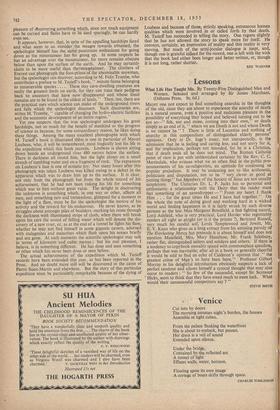Lessons
What Life Has Taught Me. By Twenty-Five Distinguished Men and Women. Selected and arranged by Sir James Marchant. (Odhams Press. 9s. 6d.) MIGHT one not expect to find something anarchic in the thoughts of the old, since they are about to experience the anarchy of death in a natural course, even a positive and malicious pleasure in the possibility of everything they hoped and believed turning out to be not so—" fish, ant and stone, coming into their own," or death simply as an end of it, " where we are Death is not and where Death is we cannot be " ? There is little of Lucretius and nothing of anarchy in this compendium of distinguished elderly persons' opinions.- Only in Dr. Inge's essay, not unexpectedly, is the admission that he is feeling and caring less, and not sorry for it, and the implication, perhaps not intended, for he is a Christian, that if death ends all he does not mind. The Roman Catholic point of view is put with unblemished certainty by the Rev. C. C. Martindale, who evinces what we so often find in the public pro- nouncements of his co-religionists, an aptitude for confessing to popular prejudices. It may be endearing not to like arithmetic, politicians and disputation, not to be " very clever or good at putting things" but Members of the Society of Jesus are not usually simpletons. The Unitarian Dr. L. P. Jacks has so personal and enthusiastic a relationship with the Deity that the reader must feel something of an eavesdropper — " From my heart I thank Him . . . for the great times He and I have had together." On the whole the note of doing good and working hard in a wicked world and finding happiness in it is fairly struck by such diverse persons as the late Miss Margaret Bondfield, a fine fighting record, Lord Ashfield, who is very practical, Lord Horder who regrettably renders all right as alright (or is it the printer ?), Bertrand Russell, very much his candid self, Lords Templewood and Jowitt, Mr. E. V. Knox who gives us a long extract from his amusing parody of The Everlasting Mercy but pretends it is about himself and does not mention Masefield, Mrs. Mary Hamilton, Mr. Frank Salisbury, rather flat, distinguished sailors and soldiers and others. If there is a tendency to copybook morality spiced with commonplace anecdote, perhaps that was inevitable; after all in a book so generally cheerful it would be odd to find an echo of Calderon's opinion that " the greatest crime of Man's to have been born." Professor Gilbert Murray in his delightful introduction obviously suspects a lack of perfect candour and allows himself a cynical thought that may also occur to readers : " So few of the successful, except Sir Seymour Hicks, seem to think that they have owed much to mere luck. What would 'their unsuccessful competitors say ? "
STEVIE SMITH










































 Previous page
Previous page